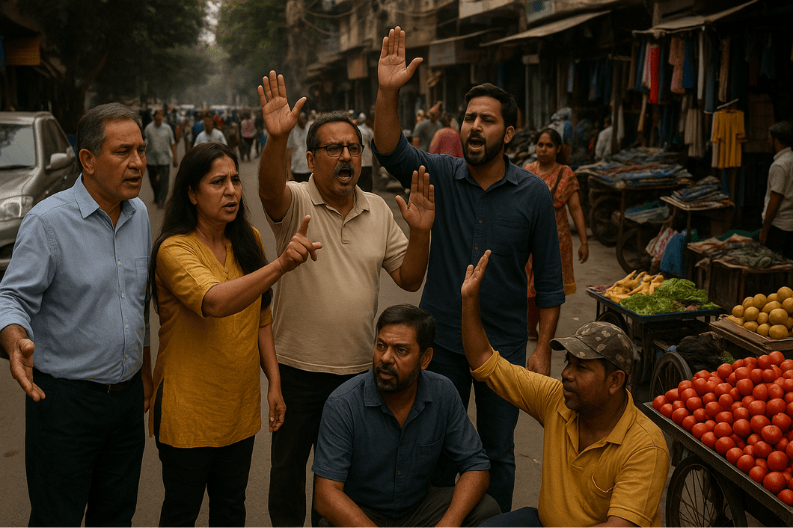In Ghaziabad, Residents of Indirapuram fight against illegal vendors as growing street encroachments disrupt their daily lives. People living near the Bihari Market in Niti Khand 2 say that vendors have taken over public pathways and parts of the main roads, making it hard to walk or drive, especially during the evening rush.
Rohit Gupta, a member of the Residents’ Association board, said the situation has become unbearable. “We pay high taxes for civic services, yet receive little support from the Ghaziabad Development Authority or local administration,” he stated. Many residents share his frustration, feeling that despite paying for better facilities, they face worsening conditions and poor urban management.
Locals claim that most vendors and shop owners in the area lack valid licenses. This raises concerns about safety and unauthorized construction. Deepak Bellani, another resident, said that corruption allows these illegal setups to continue. “If we don’t challenge these corrupt practices, reclaiming public spaces will remain impossible,” he warned.
The situation has worsened near economically weaker section (EWS) flats, where many units have been converted into small shops. These converted buildings lack proper drainage and facilities. During the rainy season, residents often face flooding because footpaths are blocked by vendors and water has nowhere to go. Resident VV Joshi said, “The drainage is so poor that even light rain floods the streets.”
In response, the residents have formed an Encroachment Removal Task Force (ERTF) to take collective action. The group’s goal is to remove illegal vendors and restore public spaces. On November 3, members held a community meeting to discuss how to handle encroachments around Krishna Apra Market and Ward 99.
Vineet Tyagi, a member of the task force, emphasized the importance of unity. “We must keep pressure on our elected representatives and ensure that local authorities enforce the law,” he said. The ERTF also plans to submit a written complaint to the municipal corporation demanding immediate action.
Residents say they are not just fighting for convenience, but for safety and civic order. Many believe that the presence of illegal vendors could lead to traffic accidents, especially on narrow streets. They also argue that unchecked street vending lowers the value of nearby properties and harms the overall look of their neighborhood.
The problem extends beyond Indirapuram. Many parts of Ghaziabad face similar challenges where public spaces are shrinking due to illegal vending. Urban planners point out that without strict enforcement, such encroachments could turn busy streets into unsafe zones. Local authorities must find a balance between supporting small businesses and maintaining public safety.
Experts suggest that creating designated vending zones could be a practical solution. These zones would allow vendors to earn a living legally while keeping footpaths and roads clear. However, this requires proper planning, coordination, and long-term commitment from the administration.
As Ghaziabad continues to expand, space and infrastructure demands are growing. Residents believe that if local governments take strict measures now, they can prevent more serious problems in the future. They also hope that public participation, transparency, and accountability will lead to cleaner and safer neighborhoods.
In conclusion, Residents of Indirapuram fight against illegal vendors to protect their streets and community spaces. Their unity and determination highlight the power of civic engagement. With support from the authorities and awareness among citizens, Indirapuram could soon set an example for other urban areas facing similar issues.



